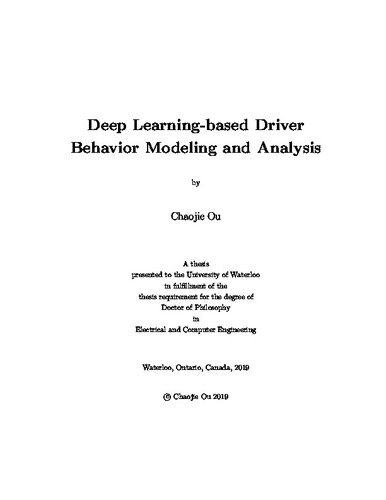| dc.description.abstract | Driving safety continues receiving widespread attention from car designers, safety regulators, and automotive research community as driving accidents due to driver distraction or fatigue have increased drastically over the years. In the past decades, there has been a remarkable push towards designing and developing new driver assistance systems with much better recognition and prediction capabilities. Equipped with various sensory systems, these Advanced Driver Assistance Systems (ADAS) are able to accurately perceive information on road conditions, predict traffic situations, estimate driving risks, and provide drivers with imminent warnings and visual assistance. In this thesis, we focus on two main aspects of driver behavior modeling in the design of new generation of ADAS.
We first aim at improving the generalization ability of driver distraction recognition systems to diverse driving scenarios using the latest tools of machine learning and connectionist modeling, namely deep learning. To this end, we collect a large dataset of images on various driving situations of drivers from the Internet. Then we introduce Generative Adversarial Networks (GANs) as a data augmentation tool to enhance detection accuracy. A novel driver monitoring system is also introduced. This monitoring system combines multi-information resources, including a driver distraction recognition system, to assess the danger levels of driving situations. Moreover, this thesis proposes a multi-modal system for distraction recognition under various lighting conditions and presents a new Convolutional Neural Network (CNN) architecture, which can operate real-time on a resources-limited computational platform. The new CNN is built upon a novel network bottleneck of Depthwise Separable Convolution layers.
The second part of this thesis focuses on driver maneuver prediction, which infers the direction a driver will turn to before a green traffic light is on and predicts accurately whether or not he/she will change the current driving lane. Here, a new method to label driving maneuver records is proposed, by which driving feature sequences for the training of prediction systems are more closely related to their labels. To this end, a new prediction system, which is based on Quasi-Recurrent Neural Networks, is introduced. In addition, and as an application of maneuver prediction, a novel driving proficiency assessment method is proposed. This method exploits the generalization abilities of different maneuver prediction systems to estimate drivers' driving abilities, and it demonstrates several advantages against existing assessment methods.
In conjunction with the theoretical contribution, a series of comprehensive experiments are conducted, and the proposed methods are assessed against state-of-the-art works. The analysis of experimental results shows the improvement of results as compared with existing techniques. | en |

